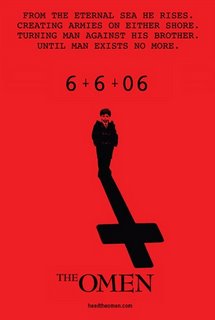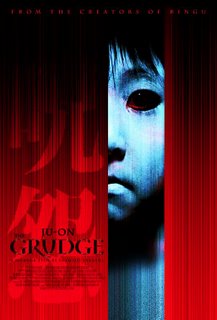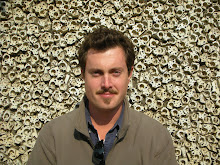 A couple of weeks ago I had the good fortune to watch the second season of Deadwood on DVD. This is how I catch most of my pay-cable shows, since I'm far too cheap (read: poor) to actually spring for the HBO. It's okay, though. Donations are accepted.*
A couple of weeks ago I had the good fortune to watch the second season of Deadwood on DVD. This is how I catch most of my pay-cable shows, since I'm far too cheap (read: poor) to actually spring for the HBO. It's okay, though. Donations are accepted.*Now, if you haven't been privy to the Deadwood thus far, it's the story of an illegal settlement in what is now South Dakota during 1877-78, a mining town devoid of law and/or order. The town was settled on Indian (Native American) land, without treaty, during a gold rush second (at that time) only to the 1849 strike at Sutter's Mill in California. Deadwood is a lawless town, not unlike many towns of the early American west, but this series marks the first time that such lawlessness and primal language, such utter disregard for civilization and its trappings (and yet, strangely, the attempt to hew civilization from rough stone, dirt, and gold ore) have been shown in any honesty to a viewing public. David Milch, creator and head writer of the show,** has a long history of putting questionable (read: potentially offensive and/or groudbreaking and/or envelope-pushing) material on television, a history that started with Hill Street Blues, on to NYPD Blue, and now he's accepted the opportunity to take salty talk back in time like a pottymouthed Doc Brown with a leather-chaps fetish. Huzzah to David Milch.
But it's the pottymouth I really want to talk about here. In the course of a single episode of Deadwood, one is treated to a plethora ("Si, Jefe, a plethora.") of Fucks, Cocksuckers, Fucking Cocksuckers, Motherfuckers, Cunts, Shitbirds, Shitbags, Shitferbrains, and Motherfucking Shitbird Cocksucker Cunts who may or may not have Shitferbrains. It's truly enlightening dialogue, people, and it's something we're not treated to everyday.
(Unless you work on an aircraft carrier. Or in a bar. But that's beside the besides...)
I also recently availed myself of the Netflix opportunity to see M*A*S*H again--the 1970 Robert Altman film, not the Alan Alda TV show. And, were it not for a spot that aired as an AMC promo for a subtitled-with-trivia airing of an edited version of Altman's film, I would not have known that M*A*S*H was the first (1970!) American motion picture to be released complete with an F-bomb. Amazing.
Nay. Fucking amazing.
Profanity is a strange, strange concept in this day and age. We are a country that has gone through a bloody revolution, a frontier-expansion period of Manifest Destiny that lasted (if you count Alaska) well into last week, gold rushes and industrial revolutions and union wars and Teamsters murders, two World Wars with a third on the way, and a major international asskicking in Vietnam, all of which must have had people saying something more profound than "Sugarbritches, I just got mama-effing shot by that...that...that dagblamed doodoohead." No. NO! Nonononono. That's not the way people talk. Life is not a Looney Tune, and nobody has ever really meant any utterance of "TarNAtion!" When their feet are to the fire, people cuss. Really cuss. Loud and often.
(Except for the Mormons. It's a well-known fact of anatomy that their bodies feature an outlet--not unlike an anus, though not as rosy-smelling--that blows every impetus for foul language out into the ether. I've also heard that rebellious Mormon children sneak into the trash bins at Salt Lake City Starbuck's-es to huff coffee grounds. It's sad, really, to see the brown stains around the mouths and nostrils of so many impressionable young inhibitionists. Sadder still to hear their half-hearted yet caffeine-riddled attempts at cursing through their angst. Tragic, even. But...)
I remember watching the first episode of Milch's NYPD Blue, way back before Zach Morris joined the show. I would have been fourteenish, and I remember Dennis Franz's Detective Sipowicz advising a female ADA to "Ipso facto this [grabbing crotch in handheld-camera closeup], you pissy little bitch." The partial female (and eventually--ugh--Franz-based male) nudity was cool, but mostly I remember the elation I felt hearing those words on broadcast television for the first time. These were words I heard my people using, but they were shocking in spite of the fact that they were an everyday and that I had heard them the Saturday night prior on SNL. Kevin Nealon was doing the Weekend Update, mentioned the fact that Tuesday night's NYPDB premiere would be the first show to air said words on television, therefore rendering the NYPDB's transgressions a tad bit late. Brilliant TV all the way around. Kudos fifteen years after the fact to all involved, should any of you be reading this. My heart goes out to all you bitches.
So Chicago Hope was the first primetime program to air the word Shit, and now it's on every episode of every show on FX (I like The Shield and IASIP, but I just don't get the appeal of Rescue Me***) and even a couple on TNT. Seinfeld (if I remember correctly) even aired a Son Of A Bitch or two during the last few years of its run. They definitely had an Ass in there at some point, and that show is the Gold Standard Of Class in my book.
A movie came out last fall called The Aristocrats, and its tagline was something like: "No Sex. No Violence. Unspeakable Profanity." We saw it at our local arthouse, and R.'s girlfriend A. walked out with 30 minutes left due to the aforementioned unspeakables. Let's allow her to represent Most Of America, while the other of us dirty cocksuckers (metaphorically speaking, here) shall represent Honest Americans Going About Their Entertainment. We sat through the entire film and heard the same unbelievably filthy joke told in numerous incarnations, spun out through various circumstances in an atomsmasher of filth and brilliance, and we laughed our pretty asses off for an hour and a half. Were we offended? No. Was A.? Abso-fucking-lutely. But what, then, was so horrifically offensive about the film? It featured an ages-old vaudeville joke, passed down through generations of dressing-cubicle-inhabitants and greenroom-junkies, that put the onus of a really nasty joke on the teller.**** The very thought of the joke (because the punchline, after all, is always the same) is the offense, as the joke's body changes like a shapeshifter from some much-more-offensive horror flick. And yet that very thought, it would appear, is enough to put a reasonably sensible girl into the lobby with two reels left. Strange.
One of Lexington's reliable local newscasts recently did a two-or-three night Special Report on the Power of Profanity. They claimed that Profanity is losing its power in our go-go modern world, where you can hear on television the same kind of filth you once had to join the Navy to witness. Must have been a slow news week. During one segment they showed a clip from The 40-Year-Old Virgin, in which Steve Carell's titular character screams out "KELLY CLARKSON!" while being waxed by a sadistic Vietnamese salon employee under the watchful glare of his friends. He didn't swear under the torture being visited upon him, and that was indicative of his stature as an uncorrupted male. Were he to have been a non-virgin at the point of his waxing, we might have expected something a little more colorful--if less creative--to have escaped his never-touched-pussy lips. But as it was, the news report used that clip as an example of how we can hope to curb ourselves of the cursing habit, how we can rid our mouths--if not our minds--of the filth that accumulates during lifetimes lived in Profanity's sewage-y wake.
 But there's something to be said for Profanity, people, and I'll say it right now: It's Goddamned Mutherfucking Time To Legalize The F-Bomb In America. The S-bomb has already breached our perimeters, and we seem to be faring just as fucking poorly with, as without it. We live in an entertainment-driven society, a society driven by visions of brutality, violence, and anger that seem to be exempt from the rules we place on simple words. You can't say some shit on broadcast television, for instance, but you can show every form of sensational bloodthirsty childraping bodydesecrating whoreslicing gunshotbleeding vengeancekilling traumasurgeoning violence on any show named by abbreviation. Just look at Law & Order, L&O SVU, L&O CI, CSI, CSI:NY, CSI:Miami, ER--and that abbreviation rule excludes shows like Criminal Minds, Medium, Ghost Whisperer, Crossing Jordan, Cold Case, Without A Trace, Numb3rs, and every show like them that's not on the Big Four. Hell, take it back to any other example that's no longer on the air. On television as in film, there is plenty of wiggleroom when you're selling violence, but none when it comes to the profanity that such violence would seem to warrant. Are there simply very urbane, very civil crime victims out there that these shows have found and exploited? Or do we live in the midst of a vicious double standard that rates a heinous act lower than a dirty word on the big totem pole of propriety?
But there's something to be said for Profanity, people, and I'll say it right now: It's Goddamned Mutherfucking Time To Legalize The F-Bomb In America. The S-bomb has already breached our perimeters, and we seem to be faring just as fucking poorly with, as without it. We live in an entertainment-driven society, a society driven by visions of brutality, violence, and anger that seem to be exempt from the rules we place on simple words. You can't say some shit on broadcast television, for instance, but you can show every form of sensational bloodthirsty childraping bodydesecrating whoreslicing gunshotbleeding vengeancekilling traumasurgeoning violence on any show named by abbreviation. Just look at Law & Order, L&O SVU, L&O CI, CSI, CSI:NY, CSI:Miami, ER--and that abbreviation rule excludes shows like Criminal Minds, Medium, Ghost Whisperer, Crossing Jordan, Cold Case, Without A Trace, Numb3rs, and every show like them that's not on the Big Four. Hell, take it back to any other example that's no longer on the air. On television as in film, there is plenty of wiggleroom when you're selling violence, but none when it comes to the profanity that such violence would seem to warrant. Are there simply very urbane, very civil crime victims out there that these shows have found and exploited? Or do we live in the midst of a vicious double standard that rates a heinous act lower than a dirty word on the big totem pole of propriety?Yes, this society is still fighting its way out of the arms of the Puritans. Yes, this society is still figuring out a place in the world that doesn't involve colonialism on our part or another's. Yes, this society is fighting yet another nonsense war with spurious justifications. We should be angry, people, and we should be able to voice that anger and hear it voiced. Fuck a bunch of "Profanity." It's the trees, not the forest. We seem to be content watching all the manifestations of evil sold to us as entertainment, without any of the recoil, any of the moral encumberance, any of the guilt that should go along with them. We still live, for CHRISSAKES, in a country that won't let us see pictures of the 2500-odd flagdraped coffins we've flown home from Iraq.
And yet, somehow, you can't say "That's a fucking travesty" without drawing dirty looks from the parents of young children nearby, parents whose four-year-olds will eventually wind up the victims of IED's on the streets of Baghdad, or Teheran, or wherever we have to go next for oil.
That's fucked up. I hope you agree. If not, please take a flying fuck at a rolling doughnut. This is America, after all, and I can tell you to take a flying fuck at the moooooooooon. But be well and take it light, as your opinion is as good as mine.
Peace.
*: In unmarked bills (the larger the better) or checks made payable to "Cash" or "The Human Fund: Money For People." On second thought, let's just stick to the unmarked bills.
**: Third season currently airing Sunday nights at 9 PM (EST) on HBO. The fourth season has been sadly truncated to two two-hour specials set to air at some point in the next decade, or just way-the-fuck-after whenever they get around to filming them. Sopranos fans, you know what I'm talking about.
***: Ironically, even given the freedoms of language I'm talking about in this essay, Denis Leary seems to be pulling punches when he's not swearing more extravagantly.
****: Or, more appropriately, Penn (also the director).




